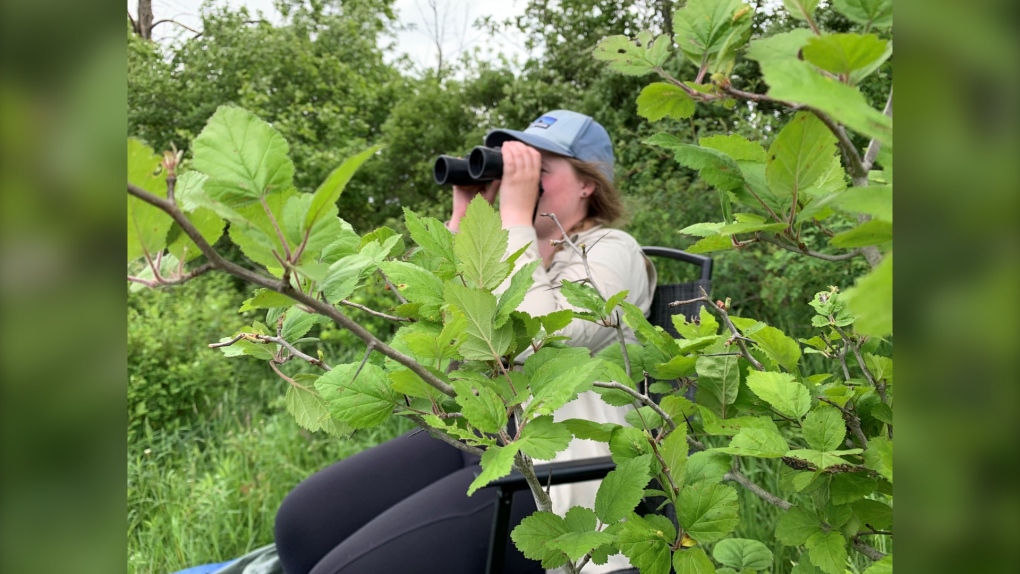Conservation authority works to save endangered spiny soft shell turtle
It’s an all-out effort to rescue one of southern Ontario’s most endangered species.
The eastern spiny soft shell turtle is at imminent risk of extinction, but staff from the St. Clair Region Conservation Authority (SCRCA) have been busy with a capture and release program along the Sydenham River, which runs through Lambton and part of Middlesex County.
“I think they're just considering their options trying to find the perfect spot, and they'll probably be back later in the day,” said Sarah Snetsinger, a watershed biologist with the SCRCA. She was sitting on a hill, observing female turtles along the riverbank.
“They're always looking for that really gravelly, sandy place to lay their eggs where it's not too steep. The spot here is pretty flat, kind of like a beach,” she said.
 Sarah Snetsinger, a watershed biologist with the St. Clair Region Conservation Authority on June 1, 2022. (Bryan Bicknell/CTV News London)Staff from the SCRCA have been busy keeping close watch on select locations along the river.
Sarah Snetsinger, a watershed biologist with the St. Clair Region Conservation Authority on June 1, 2022. (Bryan Bicknell/CTV News London)Staff from the SCRCA have been busy keeping close watch on select locations along the river.
Director of Biology Erin Carrol said they’re waiting for the turtles to lay eggs, which they will collect, then take to a lab for incubation.
“When I release those hatchlings that I've collected I know that they had no chance of survival without intervention, like next to none,” Carrol explained. “In the wild they would have been predated by raccoons or other mammals, so for me it gives me a great deal of personal fulfillment to be able to give them a little bit of a helping chance.”
It's estimated that there are only about 1,000 adult members of the species left in all of Canada. The Sydenham River is one of only a few places in Ontario where eastern spiny softshell turtle is known to nest.
The ‘Captive Hatch and Release’ program is part of the SCRCA’s recovery efforts for the species.
“There's quite a few different threats that are affecting the species, from habitat degradation, so loss of that habitat that they need to survive, as well as poaching,” said Kelli Smith, a watershed biologist with the SCRCA.
Smith said the rare turtles have been illegally collected for the pet trade, or even eaten as a delicacy — which is why they’ve asked CTV News not to disclose the location of this nesting site.
The turtles will lay eggs throughout the month of June. Incubation in the lab lasts about 60 days, before they’re sent back into the wild to fend for themselves.
CTVNews.ca Top Stories

Trump promises a 25% tariff on products from Canada, Mexico
U.S. president-elect Donald Trump said on Monday that on his first day in office he would impose a 25 per cent tariff on all products from Mexico and Canada, and an additional 10 per cent tariff on goods from China, citing concerns over illegal immigration and the trade of illicit drugs.
'Devastating:' Ford warns of impact of new tariffs promised by Donald Trump
Ontario Premier Doug Ford is warning that Donald Trump’s promise to impose a 25 per cent tariff on goods arriving in the United States from Canada and Mexico could have a 'devastating' effect on the province’s economy.
Legault says Trump's 25 per cent tariff would pose 'huge risk' for Quebec, Canadian economies
Premier François Legault says President-elect Donald Trump's threat of a 25 per cent tariff on all imports would pose a 'huge risk' to the Quebec and Canadian economies.
Premiers seek 'urgent' meeting with Trudeau before Trump returns to White House
Canada's premiers are asking Prime Minister Justin Trudeau to hold an urgent first ministers' meeting ahead of the return to office of president-elect Donald Trump.
Here's how much Alberta exports to the United States
With the United States being Alberta’s top trade partner, sweeping 25 per cent tariffs proposed by President-Elect Donald Trump could have a major effect on the province’s economy.
'It's just not fair': Retirees speak out on being excluded from federal rebate cheques
Carol Sheaves of Moncton, N.B., says it's not fair that retirees like her won't get the government's newly proposed rebate cheques. Sheaves was among the seniors who expressed their frustrations to CTVNews.ca about not being eligible for the $250 government benefit.
NDP support for part of Liberal relief package in question, as House stalemate persists
After telling Canadians that New Democrats would back Prime Minister Justin Trudeau's holiday affordability package and help pass it quickly, NDP Leader Jagmeet Singh now wants it split up, as he's only ready to support part of it. Public Services Minister Jean-Yves Duclos said the Liberals are 'certainly open to working with the opposition parties,' to find a path forward.
Deer spotted wearing high-visibility safety jacket in Northern B.C.
Andrea Arnold is used to having to slow down to let deer cross the road in her Northern B.C. community. But this weekend she saw something that made her pull over and snap a photo.
Canadian Army corporal fined for stolen valour at Remembrance Day ceremony
A corporal in the Canadian Army has been fined $2,000 and given a severe reprimand for wearing service medals he didn't earn during a Remembrance Day ceremony in Alberta two years ago.

































